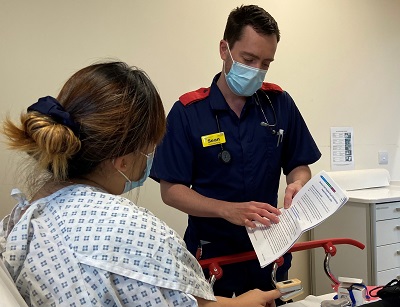27 January 2022
 A team of specially trained nurse practitioners has already avoided 333 COVID-19 patients from being admitted to Frimley Health's hospitals by treating them at home and monitoring them remotely.
A team of specially trained nurse practitioners has already avoided 333 COVID-19 patients from being admitted to Frimley Health's hospitals by treating them at home and monitoring them remotely.
The ‘virtual wards’ can be offered to patients with COVID-19 who present at the Trust's emergency departments, or to those who have been admitted to a ward but have improved enough to go home with additional monitoring.
This care is suitable if the patient does not need oxygen treatment but should be monitored to prevent admission or an unplanned return to hospital.
Patients who are well enough for the programme are provided with a pulse oximeter so their oxygen levels can be observed and are closely monitored at home for 14 days after their symptoms developed.
Extremely vulnerable patients, or those who live on their own, are called each day by a nurse practitioner, who checks them in the same way they would on a hospital ward round. Patients are also given a helpline number so they can receive clinical help and guidance seven days a week.
If their oxygen levels drop during that time and their condition deteriorates, they may be admitted to hospital for additional treatment. However, the majority of patients make a full recovery without needing any further care in hospital.
Sean Harding, Consultant Nurse in Acute Care and Frimley Health's clinical lead for Medical Same Day Emergency Care, said: “Patients either come to our Emergency Department feeling unwell following a positive test result or their chest X-ray shows signs of a COVID infection. They are then fully assessed to gauge the severity of their symptoms.
“Depending on how the patients are feeling, their oxygen levels and any underlying health conditions, they may be offered care in the ‘virtual COVID wards’.
“The system sees COVID patients receive the same care they would in hospital but from the comfort of their own home.
“Patients are really appreciative of the service and feel reassured that they have access to clinical advice whenever they need it. It is better for patients and their families and it also limits the spread of the virus.”

